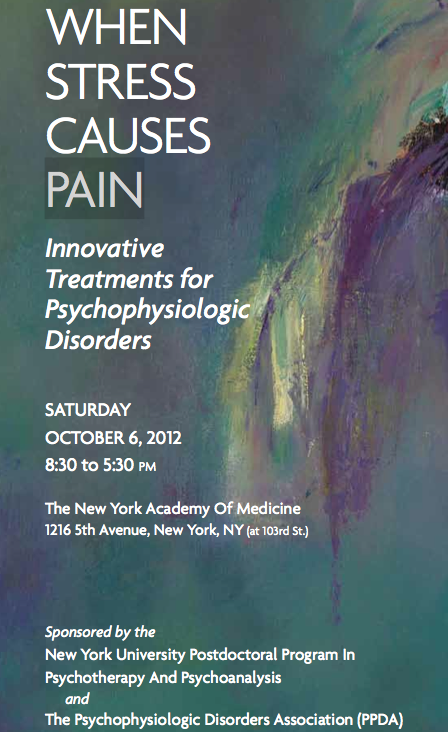Did you know that there are millions of people who are suffering from pain and other symptoms brought on by disorders that may appear to be purely physical but originate through unconscious emotions?
A few days ago, I had the pleasure of attending the conference: When Stress Causes Pain: Innovative Treatments for Psychophysiologic Disorders that was sponsored by the NYU Postdoctoral Program and Psychophysiologic Disorders Association.
It was a day packed with fascinating and informative presentations about pain and how this tends to be misunderstood and not addressed in the optimal manner by both the medical and mental health professions.
The above is a brief video clip of Howard Schubiner, MD [one of the presenters at the conference] explaining how psycho-physiologic disorders or mind-body syndrome develop [at another occasion].
Some of my key take-aways:
- Many people who are suffering from chronic pain have psycho-psychologic disorders (PPD).
- PPD cause real physical symptoms that are not due to pathological or structural abnormality and are not explained by diagnostic tests.
- PPD manifest as: tension headaches, migraines, back pain, fibromyalgia, pelvic pain, chronic tendinitis, repetitive stress injury, foot pain syndromes, irritable bowel syndrome, insomnia, chronic fatigue syndrome, anxiety, depression, numbness and tingling and more.
- Barriers to successful treatment include: attitudes of medical clinicians [PPD diagnosis blindness] and patients’ reluctance to accept the diagnosis.
- Symptoms result from a physiologic process; stress impacts the brain and the brain causes the symptoms…
- The pain is real. Emotional and physical pain activate the same brain regions.
- The symptoms can be relieved by uncovering a person’s hidden current or childhood stresses [or traumas] and treating with a variety of evidence-based techniques.
This is the first post on the topic of stress and pain. In subsequent posts, I will share additional learnings from the conference including helpful tips for diagnosis of PPD and effective methods of treatment.
What are your thoughts/comments about mind-body syndrome?
References:
“When Stress Causes Pain: Innovative Treatments for Psychophysiologic Disorders.” NYU Postdoctoral Program and Psychophysiologic Disorders Association, New York, NY, October 6, 2012.



I could tell you this anecdotally from my clients! I work in a mental health setting, and I see so many people with a combo of depression, fibromyalgia, IBS, migraines etc.
So many people suffer through treatments directed at the pain but it never gets better because mentally they are unwell. Or they self medicate and this compounds everything!
Sounds like a really interesting conference.
Nectarine,
Thank you for taking the time to stop by and share some of your experiences from the field.
Have any of your clients with multiple symptoms had their suffering and pain(s) disappear and/or significantly improve after your work with them?
One of the very positive and hopeful things to emerge from this conference is that there are ways of helping people who are suffering from PPDs; they do not need to continue suffering from their pain(s) for the remainder of their lives.
In subsequent posts in this series, I will be sharing some of the innovative treatments discussed.
Thanks again,
Dorlee
I often have a discussion with a friend where she views the mind/body connection as an ascription of blame. I see it as taking responsibility.
I think the more we understand the mind/body connection the healthier we can become.
Here is how I see Health – A Jenga Game: http://wp.me/p1OifR-cN.
Marianna,
Thanks so much for sharing your thoughts about the mind/body connection. I totally agree with you that that more we understand this connection, the healthier we can become.
I also love your Jenga Game view of health 🙂 Ignoring one aspect of health or removing one more “Jenga piece” may lead one to succumb to ill-health and dis-ease…
As per this conference, I would only suggest adding hidden [typically childhood] stresses that may need to be released/expressed as an adult as an additional “Jenga piece” to be considered.
There are times when I really feel tired and my stomach would just mysteriously hurt as if it have cramps. I always think that this is because of the stress filling in after my work.